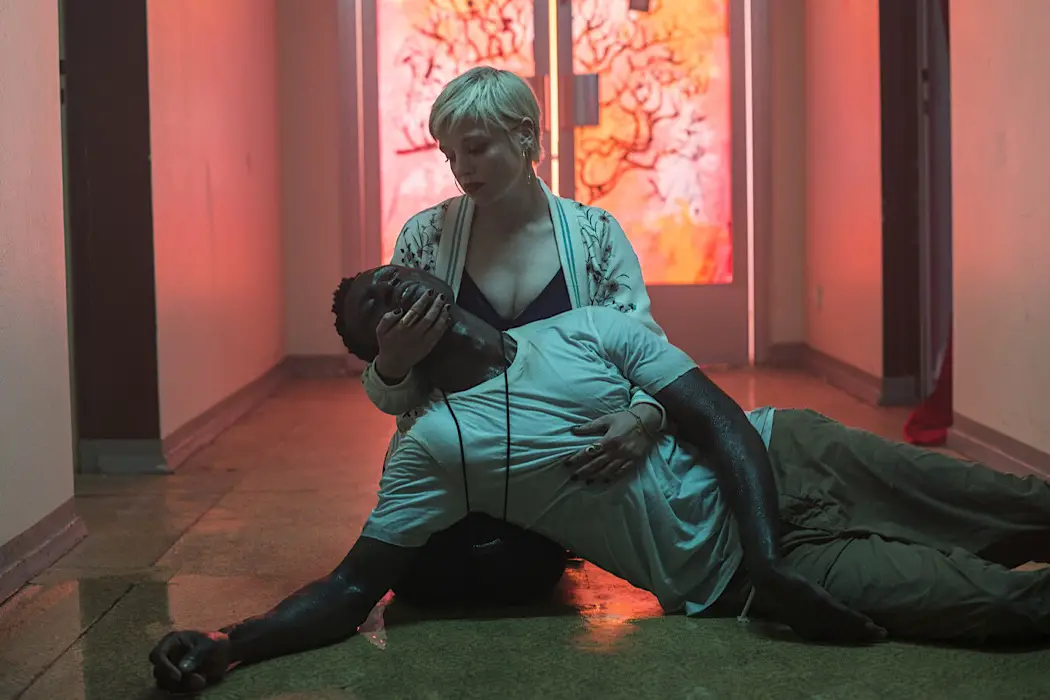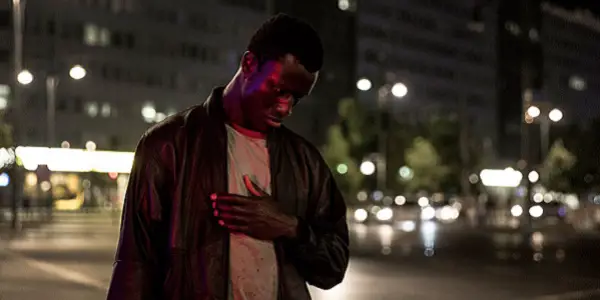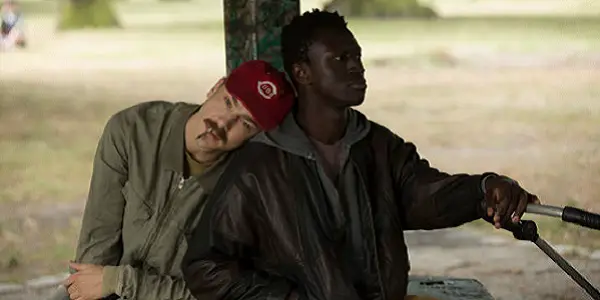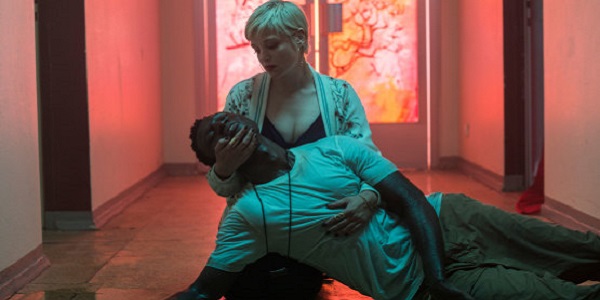BERLIN ALEXANDERPLATZ: A Modern Reimagining of a Weimar Classic

Lee Jutton has directed short films starring a killer toaster,…
A masterpiece of modernist literature that epitomizes the Weimar Republic more than any other novel from that time, Alfred Döblin’s Berlin Alexanderplatz feels as though it should be unadaptable. Originally published in 1929, the story of Franz Biberkopf, a working-class man who is released from prison and unable to re-acclimate to life in a Berlin that is violently in flux, is told in the form of a massive, messy collage of multiple perspectives, fantasy sequences, side stories, and stream-of-consciousness. It’s hard to imagine anyone being able to adapt it for the screen without losing some of its rich complexity in translation.
And yet, Berlin Alexanderplatz has now been made into a movie no less than three times. The first, an early German sound film released in 1931, has the advantage of being co-written by Döblin himself and shot not too long after the novel takes place; despite trimming most of the novel’s meat down to a mere 90-minute movie, it’s still a richly authentic depiction of an era long gone by. The second and most famous is Rainer Werner Fassbinder’s 15-and-a-half hour epic, which manages to faithfully interpret on the screen almost everything Döblin put down on the page (and then some) courtesy of Fassbinder’s manic genius and passion for the material.
The third, and most recent, is Burhan Qurbani’s reinterpretation of Franz Biberkopf as Francis, an undocumented immigrant from Guinea-Bissau who gets sucked into Berlin’s criminal underworld when he, like Franz before him, feels that he has no other options in order to survive. With its bravura performances and three-hour length, Qurbani’s Berlin Alexanderplatz makes for an epic exploration of life in modern Germany for those doomed to exist on its margins. And yet, for all its technical brilliance, the film’s decision to modernize a book so very much of its time means that some elements of the story inevitably feel out of place.
“How Is One to Live if One Doesn’t Want to Die?”
Francis (Welket Bungué) washes up on the shores of Europe as a refugee; he survives at the expense of a woman named Ida, which is also the name of the girlfriend whose death lands the original Franz Biberkopf in prison. Like Franz, Francis is haunted by those memories of struggle and death and desperate to start a new life. He ends up in a run-down hostel among other undocumented immigrants working construction jobs; in one brief but memorable scene, the water in his shower turns to blood, a reminder of the steep price paid for his journey.

One day, a strange, slim, soft-spoken German man arrives at the hostel and offers the immigrants a chance to escape the drudgery of their current work by selling drugs for him in Hasenheide Park. Francis isn’t interested, but when he loses his construction job, he has nowhere else to turn but to this man, Reinhold (Albrecht Schuch). At first, Francis works for Reinhold as a cook, bringing food to the men dealing drugs in the park, but soon, he is roped into another, stranger gig: taking women off Reinhold’s hands. Reinhold is constantly bringing home different women, but as soon as he is finished with them, he is overwhelmed with disgust; Francis is given the task of getting the women out of the flat before Reinhold’s violent temper gets the better of him.
After Francis—eventually dubbed Franz by his new German friends—gets involved with an Afro-German club owner named Eva (Annabelle Mandeng), the violently jealous Reinhold ropes Francis into a robbery gone awry that results in Francis losing an arm. He is taken by Eva to the home of an escort named Mieze (Jella Haase) to recover, and yet, even as he falls in love with Mieze, Francis cannot resist the strangely seductive siren song of Reinhold. As he once again gets involved in the world of crime, his inability to extricate himself from this twisted relationship threatens to destroy what little happiness he has managed to find in Berlin.
“A Hammer Blow to the Head Can Injure the Soul”
Despite taking place nearly 100 years after the book was first published, those familiar with Döblin’s novel and any of the previous adaptations will recognize the main characters and story beats of this Berlin Alexanderplatz, including kindly Eva, tragic Mieze, and psychotic Reinhold. Qurbani’s bold direction incorporates hallucinatory imagery culled from the dream sequences that populate the novel as well as flashes of the book’s mythological subtext, including the infamous bit about the Whore of Babylon, while Haase’s Mieze narrates the story with her lyrical musings on Francis and his failed attempts to extricate himself from a life in the underworld. (Fassbinder’s version also featured voiceover narration, but ever the multitasker, he did it himself.)

The homosexual subtext between Francis and Reinhold—a disturbing relationship built on the idea that women are disposable and the dependability of each other—is stronger here than it was in Fassbinder’s version, and yet I would have liked to have seen even further exploration of that element in this film. At one point, Reinhold not only encourages Francis to take a woman off his hands but watches gleefully as Francis and the woman proceeded to have sex; one cannot tell if his greater desire is to inhabit a body as fit and virile as that of Francis or to have sex with Francis himself. That Francis and Reinhold embody such different forms of masculinity only adds to their dependency on each other. This is further compounded by Francis losing his arm, which he says makes him feel like half a man. It’s as though he needs Reinhold to be whole, even if Reinhold was the cause of his predicament in the first place (and likely did the deed for that very reason).
In order to buy into such a bizarre friendship, one requires the perfect actors to bring Francis and Reinhold to life. Fortunately, Qurbani has them. The extremely handsome and charismatic Bungué is impossible to take your eyes off of whenever he is on screen; in fact, his Francis is almost too appealing to be believable as the hapless Franz, with his poor decision-making and increasingly misguided loyalty to a man who is clearly a psychopath. But that psychopath, as played by Schuch (who won the German equivalent of the Best Supporting Actor Oscar for the role), does have an eerily intriguing quality about him, the kind that fascinates you against your better judgment. The best scenes in Berlin Alexanderplatz are between just the two of them, with Reinhold’s quiet menace putting the audience under his spell just as it does Francis. Mendeng is also particularly good as Eva, the person with whom Francis seems to connect most profoundly. In the original novel, that was due to a shared history; here, it is due to a shared race. Eva is one of the only non-white people Francis meets who seems to be living according to her own rules instead of someone else’s, yet she fits in almost less than Francis does, torn between her two identities: African and German.
“A Handful of People in the Depths of Silence”
As in the novel, the film focuses on the characters who populate the underbelly of Berlin, with nearly every man a gangster and nearly every woman a sex worker. Now, as someone who has visited Berlin only as a tourist (albeit several times), I didn’t expect the city as shown in Berlin Alexanderplatz to feel exactly like the Berlin I know and love. Yet I found myself startled by how little of the recognizable city and how few of its inhabitants are actually depicted here. With the exception of the scenes in the park, the majority of the movie takes place inside dark clubs, brothels, and flats, with very few ordinary people to be seen anywhere. It’s the most sparsely populated version of Berlin I’ve ever seen.

The film is beautifully shot by Yoshi Heimrath, the camera smoothly gliding through the neon-drenched spaces that these characters populate, yet it also feels as though it could take place in any big city with the requisite criminal element. That, to me, neglects a large part of what makes the original Berlin Alexanderplatz so appealing. It is a singular novel about a singular city, during a tumultuous time period that would go on to lay the ground for the horrors that would engulf Germany next; the trials and tribulations of Franz Biberkopf are the trials and tribulations of Berlin in the 1920s. That is also why I feel the decision to transpose the story to modern times—as appealing as many elements of the film are—does not entirely succeed.
Yes, the lack of opportunities available to an undocumented immigrant is similar to those available to a convicted felon, and the racist abuse Francis receives from white Germans (including Reinhold) ominously echoes the racism and antisemitism that were being stoked by the Nazi party in the days before they took power. But not everything translates so easily. In particular, the depictions of the various female characters, while true to the book and previous adaptations, feel startlingly retrograde when one places them in the context of the twenty-first century. (Mieze, in particular, suffers this fate, even though Haase is quite good in the role regardless.)
The script, co-written by Qurbani with previous collaborator Martin Behnke, is just not as strong or as interesting as Qurbani’s direction of it, and as a result, there are several instances where, without the historical context of the original story, one is left feeling as though something is missing. The film then tacks on an epilogue that, while cleverly mirroring the imagery that opened Fassbinder’s Berlin Alexanderplatz, takes a turn that is almost unbelievably corny. Qurbani seems to be trying to leave us with a sense of hope, but this feels wrong to me; I have always felt that Berlin Alexanderplatz is a story of despair.
Conclusion
There is much to admire about Qurbani’s ambitious reimagining of Berlin Alexanderplatz, but despite some strong performances and visual flair, I’m not entirely convinced Franz Biberkopf should have ever left the Weimar Republic.
What do you think? Are you familiar with the story of Franz Biberkopf? Share your thoughts in the comments below.
Berlin Alexanderplatz begins screening in select theaters and virtual cinemas in the U.S. on April 30, 2021. You can find more international release dates here.
Watch Berlin Alexanderplatz
Does content like this matter to you?
Become a Member and support film journalism. Unlock access to all of Film Inquiry`s great articles. Join a community of like-minded readers who are passionate about cinema - get access to our private members Network, give back to independent filmmakers, and more.
Lee Jutton has directed short films starring a killer toaster, a killer Christmas tree, and a not-killer leopard. Her writing has appeared in publications such as Film School Rejects, Bitch: A Feminist Response to Pop Culture, Bitch Flicks, TV Fanatic, and Just Press Play. When not watching, making, or writing about films, she can usually be found on Twitter obsessing over soccer, BTS, and her cat.













